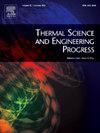Multi-factor performance analysis and optimized control strategy for a single-shaft micro gas turbine
IF 5.4
3区 工程技术
Q2 ENERGY & FUELS
引用次数: 0
Abstract
Performance analysis and control strategy optimization of single-shaft micro gas turbine (MGT) under the influence of multiple factors is conducted in this paper. A nonlinear performance simulation program is developed to comprehensively analyze the operating characteristics of simple cycle and regenerative cycle MGT. By utilizing this simulation program, the study investigates the impact of various factors such as ambient conditions, shaft speed, and different inertia combination schemes on the thermal performance of the MGT. It is empirically demonstrated that the ambient temperature and shaft speed play crucial roles in determining the steady-state performance of the MGT. Among the various inertia links, the thermal inertia of the recuperator has the most pronounced effect on the dynamic characteristics, particularly leading to a significant increase in the recovery time of the combustion chamber inlet temperature. Finally, the MGT efficiency optimization problem under the coupled influence of environmental factors and load power is investigated, and a high-efficiency optimal speed control strategy is proposed based on the back propagation (BP) neural network. The research findings indicate that, compared to traditional constant speed operation, the proposed optimal control strategy enhances the efficiency by 5.02 % under an ambient temperature of 0 °C and a load power of 40 kW. As the ambient temperature decreases, the benefits of the optimal variable speed control strategy become more apparent.
单轴微型燃气轮机多因素性能分析及优化控制策略
本文对多因素影响下的单轴微型燃气轮机进行了性能分析和控制策略优化。开发了非线性性能仿真程序,对简单循环和再生循环MGT的运行特性进行了综合分析。利用该仿真程序,研究了环境条件、轴转速和不同惯性组合方案等因素对MGT热性能的影响。经验表明,环境温度和轴转速对MGT的稳态性能起着至关重要的作用。在各个惯性环节中,蓄热器的热惯性对动态特性的影响最为显著,尤其导致燃烧室入口温度恢复时间显著增加。最后,研究了环境因素和负载功率耦合影响下的MGT效率优化问题,提出了一种基于BP神经网络的高效最优速度控制策略。研究结果表明,在环境温度为0℃、负载功率为40 kW时,所提出的最优控制策略与传统恒速运行相比,效率提高了5.02%。随着环境温度的降低,最优变速控制策略的效果越来越明显。
本文章由计算机程序翻译,如有差异,请以英文原文为准。
求助全文
约1分钟内获得全文
求助全文
来源期刊

Thermal Science and Engineering Progress
Chemical Engineering-Fluid Flow and Transfer Processes
CiteScore
7.20
自引率
10.40%
发文量
327
审稿时长
41 days
期刊介绍:
Thermal Science and Engineering Progress (TSEP) publishes original, high-quality research articles that span activities ranging from fundamental scientific research and discussion of the more controversial thermodynamic theories, to developments in thermal engineering that are in many instances examples of the way scientists and engineers are addressing the challenges facing a growing population – smart cities and global warming – maximising thermodynamic efficiencies and minimising all heat losses. It is intended that these will be of current relevance and interest to industry, academia and other practitioners. It is evident that many specialised journals in thermal and, to some extent, in fluid disciplines tend to focus on topics that can be classified as fundamental in nature, or are ‘applied’ and near-market. Thermal Science and Engineering Progress will bridge the gap between these two areas, allowing authors to make an easy choice, should they or a journal editor feel that their papers are ‘out of scope’ when considering other journals. The range of topics covered by Thermal Science and Engineering Progress addresses the rapid rate of development being made in thermal transfer processes as they affect traditional fields, and important growth in the topical research areas of aerospace, thermal biological and medical systems, electronics and nano-technologies, renewable energy systems, food production (including agriculture), and the need to minimise man-made thermal impacts on climate change. Review articles on appropriate topics for TSEP are encouraged, although until TSEP is fully established, these will be limited in number. Before submitting such articles, please contact one of the Editors, or a member of the Editorial Advisory Board with an outline of your proposal and your expertise in the area of your review.
 求助内容:
求助内容: 应助结果提醒方式:
应助结果提醒方式:


